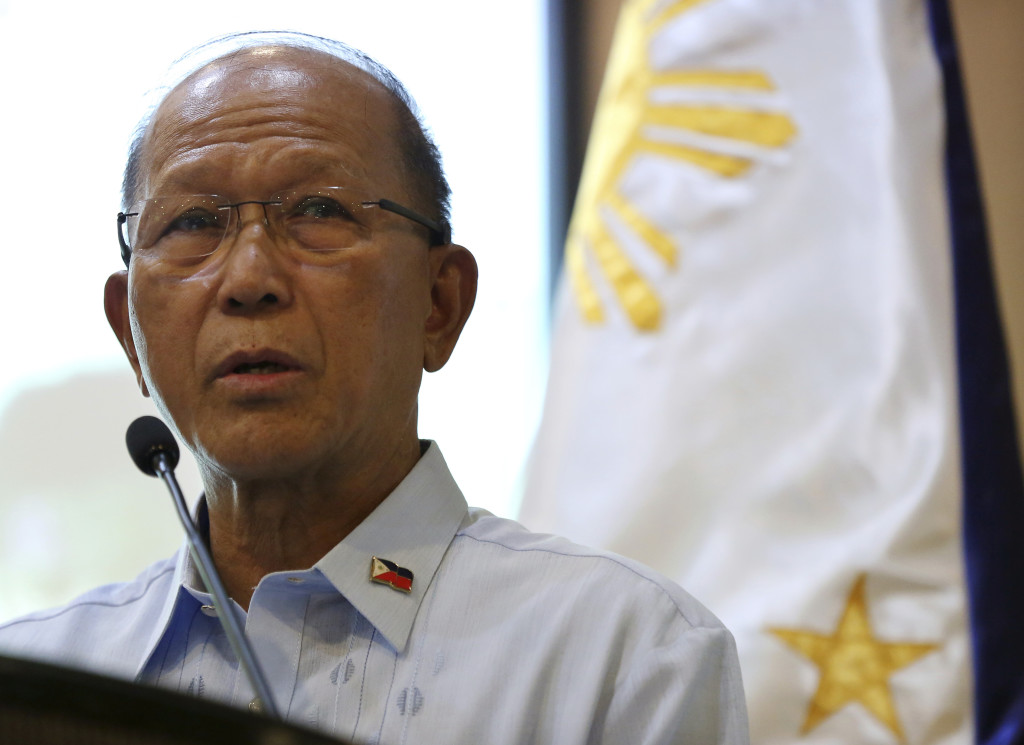Lorenzana tells AFP, allies to anticipate the future of air conflict

Defense Secretary Delfin Lorenzana. AP File Photo
Defense Secretary Delfin Lorenzana recently told the Philippine military and its closest allies to plan for the future of air conflict amid an evolving security landscape in the region.
“Since we are all friends and allies here, we have to project our minds and foresee what the face of the future of air combat will be. Will it be good to have fighter jet planes? Or maybe just invest in missiles to protect ourselves?” he said at a forum sponsored by the Philippine Air Force at Camp Aguinaldo last Thursday.
The forum, a pre-anniversary activity of the Air Force, was aimed to increase awareness among stakeholders on how air power can be mobilized to contribute to national and regional security.
Top Air Force officers from the Philippines’ most important security partners — United States, Japan, and Australia — were present to share their perspectives.
“While we are prepared for current wars, sometimes it’s good to project what the face of the future war will be. Sometimes in the military, we prepare for the past war that just ended…without thinking of the coming war,” the defense chief said.
Article continues after this advertisement“Sometimes we are shattered by past experiences and we forget to foresee what see what will happen next,” he added.
Article continues after this advertisementLorenzana recalled that when he was a young Army officer, they trained for urban operations that they did not actually use.
The Philippine Army at present is mostly trained for jungle warfare to fight communist rebels and terrorists in the mountains. It was the Marawi crisis in 2017, the five-month gun battle between government troops and ISIS-linked terrorists in the predominantly-Muslim city, that put to test their abilities in urban warfare.
“With Marawi, we were at a loss for quite some time… We had to learn to fight in urban warfare,” he said.
The siege would later turn out to be one of the country’s biggest security crises in recent years. The Philippine Air Force played a key role in the Marawi operations with its bomb runs to flush out terrorist strongholds.
“Air power is paramount to the defense of the state… The complex and dynamic nature of the regional security environment needs broader cooperation among Asean and other nations to prevent and counter violent extremism,” said Armed Forces of the Philippines chief Gen. Carlito Galvez Jr.
He also expressed gratitude to Australia, Japan, Malaysia, Singapore and US for their technical support (i.e. intelligence-sharing) and transport of relief items during the five-month crisis, at the same time noting that China had donated 50 sniper rifles.
The Philippines is facing an array of national and territorial threats, with the persistence of communist rebels and terrorist groups in the domestic front. It is also facing challenges over China’s military buildup in the South China Sea as well as other non-traditional security threats like natural disasters.
‘Working together is a necessity’
Maj. Gen. Russell Mack, deputy commander of the US Pacific Air Force, stressed the need for allies to work together to face the challenges in the region.
“Due to the main challenges we face in this AOR [area of responsibility] in this vast region, working together is a necessity,” he said.
He cited bilateral exercises and formal agreements such as the Enhanced Defense Cooperation Agreement as some of the means to boost their collective presence.
The EDCA is a signed agreement between the Philippines and US that allows the latter to increase military presence in the country through rotation of ships and planes. The agreement allows the US to five military bases.
“Access to shared spaces including freedom of overflight and freedom of navigation to international air space and waters are essential to continued security and prosperity,” Mack said.
“Pacom [Pacific Command] regularly flies bombers, fighters, ISR [intelligence, surveillance and reconnaissance] and unmanned flights in the Indo-Pacific region including the West Philippine Sea,” he added.
Quadrilateral cooperation
Gen. Yoshinari Marumo, chief of staff of Japan’s Air Self-Defense Force, cited China as one of the region’s security challenges, along with Russia and North Korea.
“The modernization of the People’s Liberation Army has rapidly expanded and intensified its activities in the vicinity of Japan… Aircraft carrier Liaoning has increased its activities by entering the Western Pacific and heightening its operation of fighters,” he said.
“China is escalating its activities around Japan and Western Pacific and is trying to make its presence a normal state,” he added.
Both the Philippines and Japan share a rival claimant in China over the South China Sea and East China Sea, respectively.
The Japanese general likewise took the opportunity to highlight the “quadrilateral defense cooperation” of the Philippines, Japan, Australia and United States.
“Last year, the first quadrilateral meeting was successfully held. The Air Force [leaders of four countries] met together to share views and agreed to continue improve our capabilities and promote defense cooperation,” Marumo said.
Air Vice Marshal Steven Robertson of the Royal Australian Air Force, meanwhile, also voiced out the need to maintain strong relationships with allies and to conduct international exercises amid security challenges.
“Our very strength, our very advantage is our alliance,” he said
“The nature of Philippines, as well as Australia, United States, and Japan, share similar visions of stability, security and rules-based approach. As close allies, we must seek integration beyond technical platforms… Our integration occurs across all aspects of government and across other services… and across allies like our wonderful partners represented today,” he said. /je